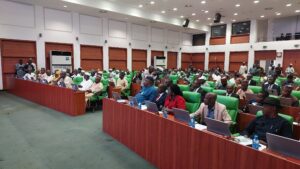Rep. Wale Raji, the lawmaker representing Epe Federal Constituency and Chairman of the House Committee on Livestock Development, has taken a bold step to reposition Nigeria’s livestock sector, driving a legislative overhaul while launching a probe into the Federal Government’s unpaid ₦498.7 million compensation owed to 307 poultry farmers devastated by avian influenza between 2021 and 2023.

Raji announced the investigation on Thursday during a public hearing on six livestock-related bills at the National Assembly Complex, Abuja. The bills aim to establish new livestock colleges, strengthen research institutions, and expand capacity-building centres designed to upgrade animal production, veterinary services, and Nigeria’s overall livestock value chain.
According to him, the public hearing offered stakeholders an opportunity to table sustainable solutions to the challenges crippling the sector, including the unresolved bird-flu compensation claims.

“We are deeply concerned about the prolonged delay in compensating affected poultry farmers,” he said. “Our committee will ensure fairness, accountability, and transparency in the entire process.”
Representing the Permanent Secretary of the Ministry of Livestock Development, Dr. Chinyere Akujobi, the Director of Veterinary Services, Dr. Adeniyi Adedoyin, disclosed that ₦3.16 billion had earlier been paid to 1,055 farmers affected by previous outbreaks. He explained, however, that the latest batch remains unpaid due to insufficient funding.
He added that the suspension of the Animal Diseases Emergency Fund in 2021 left the country without a structured financial response mechanism for animal-health crises. Adedoyin also revealed a fresh outbreak in Wukari, Taraba State, where 2,050 birds were recently culled, with compensation yet to be processed.

He attributed the delays to budget gaps and weak insurance enrolment among farmers, an issue compounded by the revised Federal Executive Council formula that requires compensation contributions of 50% from the Federal Government, 25% from states, and 25% from farmers.
Raji noted that the committee’s actions complement the broader National Livestock Transformation Plan (NLTP), which targets modernized livestock practices, enhanced veterinary delivery, and improved national food production.
“Our priority is a sustainable livestock sector that drives food security, job creation, and economic diversification,” he said. “We will ensure affected farmers get their due compensation and that government establishes emergency funds to avoid future setbacks.”

One of the bills reviewed was sponsored by Hon. Bello Ka’oje of Kebbi State and seeks to establish the Federal College of Animal Husbandry, Ka’oje, envisioned as a hub for livestock breeding, management, and innovation.
Ka’oje underscored the urgency of improving Nigeria’s global livestock performance, noting the country’s low rankings: 94th in milk production and 33rd in meat production in 2022, behind African counterparts like Egypt, Kenya, and Ethiopia.
Rounding off deliberations, Raji reaffirmed the House of Representatives’ commitment to managing livestock development with transparency and ensuring that all stakeholders, from smallholders to commercial operators, benefit from policy reforms.
“We will leave no stone unturned in repositioning the livestock industry as a backbone of national growth, rural development, and economic resilience,” he said.





